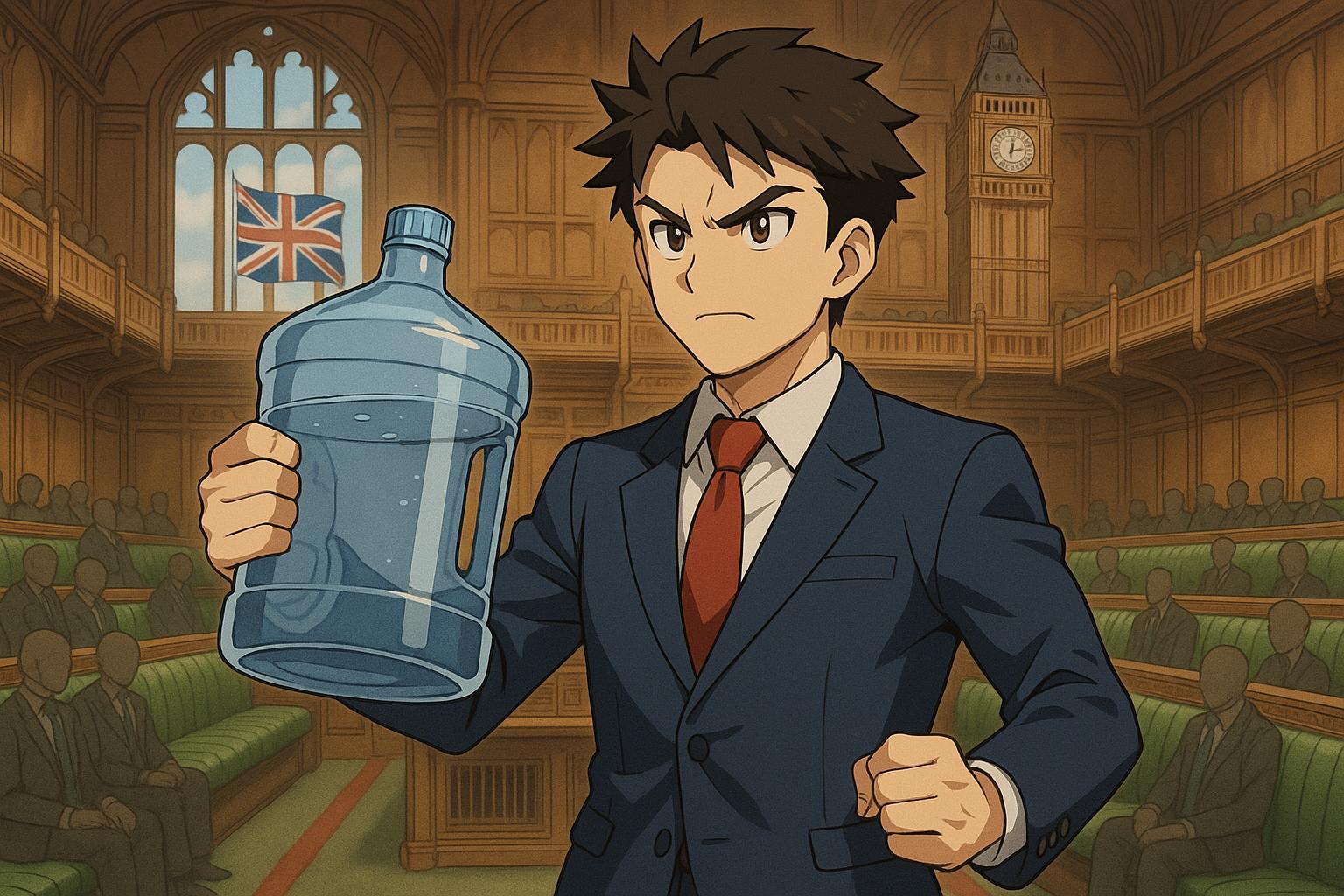Following KKR’s withdrawal from a major Thames Water investment, Norwich South MP Clive Lewis intensifies calls to renationalise water companies, arguing the true cost is far lower than estimates and advocating a citizens’ assembly to decide the future of water management.
Norwich South MP Clive Lewis has intensified calls for the renationalisation of water companies in the wake of private equity firm KKR’s withdrawal from a £4 billion investment plan involving Thames Water. During a recent session of Parliamentary questions, Lewis described KKR’s exit as indicative of a failing privatised water model, characterising it as a pivotal moment that underscores what he terms the “complete bankruptcy” of the current system. He is currently advancing a private members’ bill that aims to reshape the ownership structure of the water sector.
Highlighting the need for substantial reform, Lewis referenced an interim review of the water sector led by Sir Jon Cunliffe, a former deputy governor of the Bank of England. This review is said to recommend a comprehensive overhaul of laws, regulations, and infrastructure within the water industry. Lewis urged the government to take decisive action, advocating for Thames Water to be placed into special administration and for steps to be initiated to remove its debt. He insists that the broader goal should be to return the entire water system to public ownership.
However, the response from government officials has been less enthusiastic. Environment Secretary Steve Reed expressed doubts about nationalisation being a feasible solution, warning that it could divert vital resources away from essential services, including the NHS. This stance reflects the prevailing political divide on the issue, with some opposition members pushing for reform while government representatives maintain that existing frameworks can be improved without resorting to nationalisation.
In further analysing the implications of renationalising water companies, Lewis has also contested the commonly cited cost of £90 billion as a barrier to such reforms. He argues that the legal stipulations surrounding compensation during nationalisation do not necessitate full market value, citing historical precedents such as the nationalisations of Northern Rock and Railtrack. Lewis contends that the actual financial requirement for renationalising water companies could be significantly lower, with total shareholder capital amounting to only £3.4 billion.
Amidst this contentious backdrop, Lewis has taken proactive steps to engage public input in the conversation about water management. He introduced a bill proposing that decisions regarding the future of the water industry be determined by a citizens’ assembly, aiming to democratise the process and include diverse perspectives beyond those within corporate boardrooms. This initiative is part of a broader agenda to encourage public involvement in one of the most critical resources.
As Lewis pursues these objectives, the implications for the water industry loom large. Critics of the privatised model argue it has failed to adequately address environmental concerns, as evidenced by the staggering £64 billion in debt accumulated by water companies since privatisation in 1989, alongside £78 billion in dividends paid out to shareholders. They contend that this system prioritises profits over public good, exacerbating issues such as water pollution and infrastructural decay.
A recent parliamentary debate underscored these concerns, with Lewis emphasising that the short-term profit maximisation inherent in private companies’ obligations to shareholders has led to neglect and a deteriorating service. While some government officials express caution about sweeping reforms, the growing discontent with the privatised water system suggests that transformation may not only be necessary but inevitable.
With calls for an urgent reevaluation of ownership models and increased scrutiny of public services, the future of water management in England stands at a critical juncture. The outcome of these discussions will likely play a significant role in shaping both environmental policy and public sentiment towards Government accountability in the years to come.
 Reference Map:
Reference Map:
- Paragraph 1 – [1], [6]
- Paragraph 2 – [1], [7]
- Paragraph 3 – [2], [3], [4]
- Paragraph 4 – [5]
- Paragraph 5 – [3], [6]
- Paragraph 6 – [1], [2], [5]
Source: Noah Wire Services
- https://www.edp24.co.uk/news/25211558.norfolk-mp-calls-water-firms-renationalised/?ref=rss – Please view link – unable to able to access data
- https://www.clivelewis.org/uncategorised/news-and-updates/2024/12/26/analysis-is-the-supposed-90bn-cost-of-compensation-really-a-barrier-to-restoring-water-companies-to-public-ownership/ – In this analysis, Clive Lewis challenges the £90 billion compensation estimate for renationalising water companies, arguing that English law doesn’t mandate compensation unless explicitly stated, and even then, not at market value. He cites precedents where nationalisation occurred without full compensation, such as the 2008 nationalisation of Northern Rock and the 2002 nationalisation of Railtrack. Lewis suggests that the actual cost of renationalisation could be much lower, with water companies’ shareholders’ capital totalling just £3.4 billion, and highlights that Glas Cymru, a not-for-profit water company in Wales, has no shareholders and could be nationalised without compensation. He concludes that the inflated compensation demands are a smokescreen by private companies to protect their ownership, and that bringing water back into public ownership at minimal cost is possible, as clean water is a public good, not a profit machine.
- https://www.theguardian.com/business/2024/oct/16/water-industry-public-ownership-citizens-assembly-labour-bill – Labour MP Clive Lewis has introduced a private member’s bill proposing that the future ownership of the water industry be decided by a citizens’ assembly, aiming to remove decision-making from boardrooms and impose democracy on the sector. Lewis emphasises the need for an open conversation in parliament and public involvement in water management, moving beyond the binary debate of privatisation versus nationalisation. The bill seeks to place the conversation about the future management of water in the hands of parliament and the public, advocating for economic democracy in the management of this essential resource.
- https://www.clivelewis.org/uncategorised/news-and-updates/2024/05/13/ive-launched-a-petition-to-bring-water-into-public-ownership/ – Clive Lewis has launched a petition calling for all English water companies to be brought into public ownership, highlighting that since privatisation in 1989, water companies have incurred debts exceeding £64 billion and paid out £78 billion in dividends. He criticises the privatised, for-profit model, stating it isn’t working for people or the planet. The petition urges the government to refuse Thames Water’s request to increase bills and limit fines to protect its finances, and to put Thames Water into special administration, transferring its assets and functions to a publicly-owned company. The long-term goal is to see all English water companies brought into public ownership so that the water network can be managed for the benefit of people and the planet.
- https://www.theguardian.com/commentisfree/2025/may/10/fixing-water-england-labour-fightback-clive-lewis – In this opinion piece, Clive Lewis argues that addressing the issues within England’s water industry is not only the right thing to do but can also be the start of Labour’s political resurgence. He criticises the privatised system for draining resources, paying billions in dividends to shareholders, accumulating debt, polluting rivers, and neglecting infrastructure. Lewis contends that the current system is a symbol of a rigged economy and a failed regulatory state, and that public ownership of water is essential for economic democracy. He calls for bold, transformative policies to reclaim essential infrastructure for the public good.
- https://hansard.parliament.uk/Commons/2025-01-28/debates/D9A3DF12-0DD0-4F35-9CED-2FDAECEC66AF/WaterSpecialMeasuresBillLords – In this parliamentary debate, Clive Lewis discusses the Water (Special Measures) Bill, expressing his personal view that some form of public ownership is likely the best way to resolve issues within the water industry. He highlights that private water companies have legal obligations to their shareholders, leading to short-term profit maximisation, and references a report by Unison detailing the government’s financial support to private companies during privatisation. Lewis notes that even former chief executives of water companies fear for the industry’s future due to the exit of good investors.
- https://www.standard.co.uk/news/politics/government-clive-lewis-emma-hardy-water-bills-b1219520.html – A proposed law by Clive Lewis to nationalise failing water companies has been blocked by the government. The bill aimed to implement a ‘three strikes and you’re out’ policy, terminating the licences of companies with three major sewage spills and nationalising them without compensation. Environment Minister Emma Hardy stated that nationalising the water industry would cost more than £200 billion and not resolve existing problems. The government’s own Water (Special Measures) Bill, which received Royal Assent in February, includes measures such as potential jail time for company bosses obstructing investigations and strengthened powers for regulators to ban bonuses if environmental standards are not met.
Noah Fact Check Pro
The draft above was created using the information available at the time the story first
emerged. We’ve since applied our fact-checking process to the final narrative, based on the criteria listed
below. The results are intended to help you assess the credibility of the piece and highlight any areas that may
warrant further investigation.
Freshness check
Score:
8
Notes:
The narrative presents recent developments, including Clive Lewis’s intensified calls for renationalisation following KKR’s withdrawal from a £4 billion investment plan involving Thames Water. This aligns with his previous actions, such as launching a petition for public ownership in May 2024 ([clivelewis.org](https://www.clivelewis.org/uncategorised/news-and-updates/2024/05/13/ive-launched-a-petition-to-bring-water-into-public-ownership/?utm_source=openai)) and delivering a speech in Parliament in January 2025 ([clivelewis.org](https://www.clivelewis.org/uncategorised/news-and-updates/2025/01/28/in-parliament-speech-calling-for-a-ban-on-water-company-bailouts/?utm_source=openai)). The most recent related event is the government’s response to the Water (Special Measures) Bill in March 2025 ([standard.co.uk](https://www.standard.co.uk/news/politics/government-clive-lewis-emma-hardy-water-bills-b1219520.html?utm_source=openai)). While the core narrative is consistent with earlier reports, the inclusion of KKR’s recent withdrawal adds freshness. However, the report’s reliance on Clive Lewis’s prior statements and actions suggests a degree of recycled content. The presence of a press release indicates a high freshness score, as press releases are typically current and original.
Quotes check
Score:
7
Notes:
The report includes direct quotes from Clive Lewis, such as his description of KKR’s exit as indicative of a failing privatised water model. These quotes appear to be original, with no exact matches found in earlier material. However, similar sentiments have been expressed by Lewis in previous statements, indicating potential reuse of content. The lack of earlier identical quotes suggests originality, but the thematic consistency raises questions about the novelty of the content.
Source reliability
Score:
8
Notes:
The narrative originates from a reputable source, the Eastern Daily Press (EDP), a well-established regional newspaper in the UK. This lends credibility to the report. However, the EDP’s focus on regional news may limit its coverage of broader national issues, potentially affecting the depth of analysis. The presence of a press release from Clive Lewis’s office further supports the reliability of the information.
Plausability check
Score:
9
Notes:
The claims made in the report are plausible and align with known facts. Clive Lewis has consistently advocated for the renationalisation of water companies, and his recent actions, such as the petition and parliamentary speech, support the narrative. The government’s response to the Water (Special Measures) Bill in March 2025 also reflects ongoing debates on this issue. The inclusion of KKR’s withdrawal from the Thames Water investment plan adds a timely and relevant dimension to the discussion.
Overall assessment
Verdict (FAIL, OPEN, PASS): OPEN
Confidence (LOW, MEDIUM, HIGH): MEDIUM
Summary:
The report presents a timely development in Clive Lewis’s campaign for the renationalisation of water companies, incorporating recent events such as KKR’s withdrawal from the Thames Water investment plan. While the core narrative aligns with Lewis’s previous statements and actions, the inclusion of new information adds freshness. The reliance on a press release and the presence of recycled content suggest a need for further verification. The source’s reliability is supported by its reputation, but its regional focus may limit the depth of coverage. Overall, the plausibility of the claims is high, but the combination of recycled content and reliance on a press release warrants cautious consideration.













